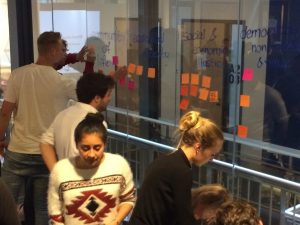
Students have diverse backgrounds, skills, talents and needs To satisfy their interests and meet their personal ambitions for future careers, education should meet students’ demand for personalisation of the curriculum and learning routes. ICLON recognizes the importance of an enriched curriculum that offers multi-disciplinary and interdisciplinary approaches to learning, choice through enhanced curricular pathways and a variety of opportunities to gain international experience including work placements, study/research abroad and attracting international staff.
Objectives
- Students develop the skills to help fulfill their ambitions;
- Facilitating more personalised learning experiences;
- Programmes offer the opportunity to students to develop a wide range of talents.
What are the key aspects?
In order to achieve personalisation of the curriculum, and engage and motivate students, it is important to actively engage them in their future career path based on their interests and ambitions. This can be done by offering them choice in modules, differentiation methods in teaching and learning, interdisciplinary minors or extracurricular opportunities.
When giving students freedom in the choice of modules, it is important that they get help with their module choices and producing a rational study pathway. For example, do the chosen modules complement each other and will they form a comprehensive body of knowledge, or a programme of transdisciplinary subjects? For students, choosing an individual study pathway is an important decision that will impact on a future career. Lack of appropriate information and guidance, could lead to poor choices, which can lead to disengagement and in the worst-case scenario even drop out. Consequently it is important to provide comprehensive information that is easily accessible (information days, Honours track, orientation module, websites, student one-stop services). Students should also have the opportunity to get personal advice on their study trajectory from both the academic (study advisors) and career perspective (career service)
Besides offering students choice in modules and extracurricular opportunities, we should also consider differentiated learning and instruction approaches to give students choice in the pace, place and mode of their learning. For example, when teaching a group of students with different needs and talents, we should consider giving students the opportunity of employing a variety of talents in assignments and learning new skills in a safe environment. (see also Teaching for active learning). Differentiation requires lecturers to tailor their practices to their students’ profiles and requires flexibility in terms of design, content, assessment and the grouping of students.
Flexible learning focuses on giving students choice in the pace, place and mode of their study, and all three aspects can be delivered through appropriate pedagogical practice. Examples of pedagogical practice are Problem Based Learning and Project Based learning. Availability of technology can encourage flexible approaches to the delivery and assessment of learning. Pace typically focuses on different delivery schedules, e.g. faster or slower completion of the module/course. Place is concerned with the physical location, which could be at home or in a classroom. Mode covers learning technologies, which provide new and flexible approaches through the wide range of ICT products, including virtual reality applications. (see Application of Technology in Teaching and Learning)
How do you know you are on the right track?
Making progress comprises (re-)designing education as well as keeping track of results. But how can you know that you are making progress? Summarizing the general process of educational design and specific models for curriculum re-design we propose the following three-step approach:
Step 1. Reformulate the (university’s) objectives into questions concerning the current situation (today) and the desired situation in the future
Step 2. Make the answers to the questions measurable
Step 3. Use the answers as input for further (re-)design
For example:
1) How do students develop the skills to fulfil their ambitions today and in the future? Examples of measurable answers: (%) skills in the curriculum/co-curricular/extra-curricular
2) How do teachers and educational programmes facilitate personalised learning experiences today and in the future? Examples of measurable answers: with the support of (x)tutors/mentors/councillors for students; by offering (%) EC in the curriculum for individual learning trajectories;
3) To what extent do programmes offer the opportunity for students to develop a wide range of talents today and in future? Examples of measurable answers: (%) curriculum for students to fill independently; (#) skills trainings offered; (x) co- and extra-curricular options
Further reading
Flexible Pedagogies: preparing for the future, https://www.heacademy.ac.uk/system/files/resources/tel_report_0.pdf
This short publication focuses on how e-learning can support flexible pedagogies. It also explains how technology could enable new choices for learners.
Example: individual track (Honours College FSW)
Individual track in Honours College FSW
Open to: All bachelor students of Leiden University
When meeting the entry criteria for the Honours College, students may compose their own individual programme. Under supervision of the Faculty Honours coordinator students plan an Individual pathway. There is a great deal of freedom and flexibility and students have the opportunity to organise internships, trips abroad, attend master’s courses, etc. However, to guarantee quality the proposed track must be approved by the Examination Board.
All students have the opportunity to take an Honours Class of 5 ECTS as part of the Honours College or as an extra-curricular module. In the video lecturers and students explain the benefits of an honours class.
